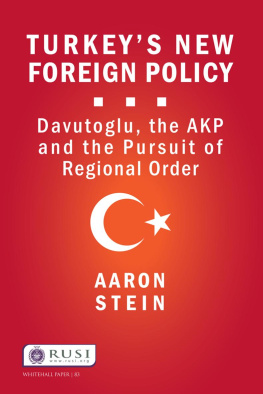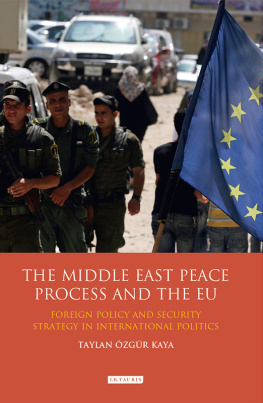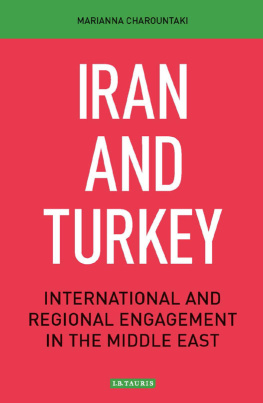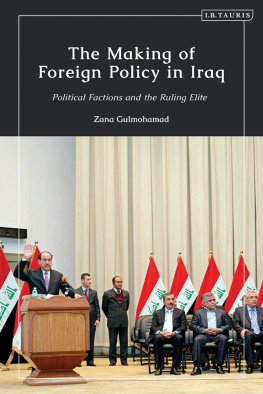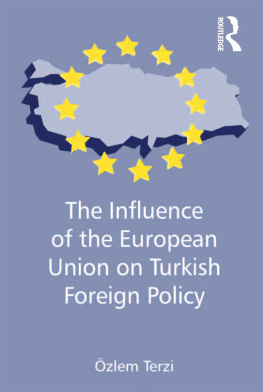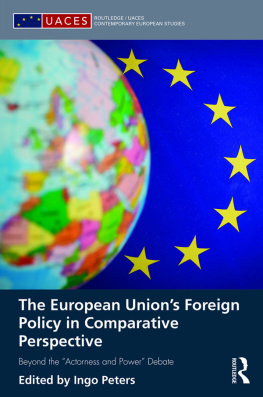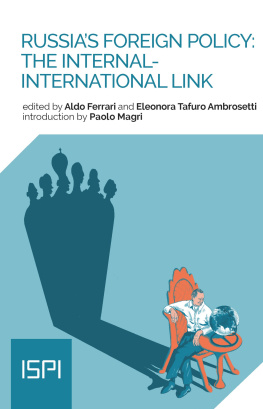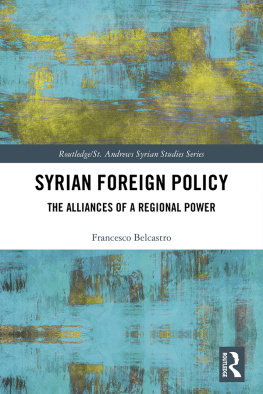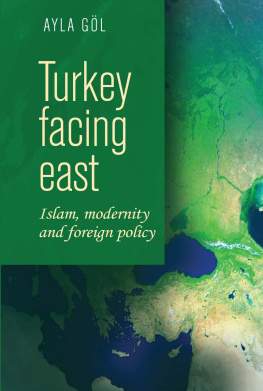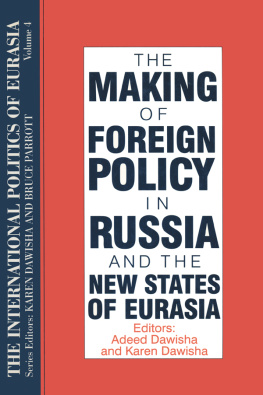
Ozgur Tufekci is an assistant professor of International Relations at Karadeniz Technical University, Turkey. He is also founder and Director-General of CESRAN International, a UK-based think-tank. He holds an MA in International Studies from the University of Sheffield, UK, and a PhD in Sociology and International Relations from Coventry University, UK. His primary research interests are (Turkish) Eurasianism, nation-building, theories of nationalism, geopolitical studies, rising powers and regionalism. He is also Editor-in-Chief of the Journal of Global Analysis, and Senior Editor of Caucasus International.
During the current turbulent times in Turkey, Ozgur Tufekci provides an important and original analysis of Turkish foreign policy from a perspective that is not only unorthodox but is highly thought-provoking. This work is an excellent contribution to the literature.
Birol Yeilada, Professor of Political Science and International Studies, Portland State University
One of the most striking aspects of Eurasianist ideology today is its spread beyond Russia to influence political discourses in other countries. Ozgur Tufekci's new study is an important contribution to understanding how this process is unfolding in Turkey.
Mark Bassin, Baltic Sea Professor in the History of Ideas, Center for Baltic and East European Studies, Sdertrn University, Stockholm
THE FOREIGN
POLICY OF
MODERN
TURKEY
Power and the Ideology of Eurasianism
O ZGUR T UFEKCI
Published in 2017 by
I.B.Tauris & Co. Ltd
London New York
www.ibtauris.com
Copyright 2017 Ozgur Tufekci
The right of Ozgur Tufekci to be identified as the author of this work has been asserted by the author in accordance with the Copyright, Designs and Patents Act 1988.
All rights reserved. Except for brief quotations in a review, this book, or any part thereof, may not be reproduced, stored in or introduced into a retrieval system, or transmitted, in any form or by any means, electronic, mechanical, photocopying, recording or otherwise, without the prior written permission of the publisher.
Every attempt has been made to gain permission for the use of the images in this book. Any omissions will be rectified in future editions.
References to websites were correct at the time of writing.
Library of Modern Turkey 22
ISBN: 978 1 78453 742 5
eISBN: 978 1 78672 117 4
ePDF: 978 1 78673 117 3
A full CIP record for this book is available from the British Library
A full CIP record is available from the Library of Congress
Library of Congress Catalog Card Number: available
For my Dearest Wife, Szen
and
Daughter, Gksu Leyla
LIST OF FIGURES
Turkey's Lebensraum
The Ottoman Empire at its greatest extent
Anatolia: Dissolution of the Ottoman Empire, 18071924
Partitioning of Anatolia and Thrace according to the Treaty of Svres
Boundaries of the modern state of Turkey
Mackinder's Heartland concept: 1904
Mackinder's Heartland concept: 1919
Mackinder's Heartland concept: 1943
Political cartoon by Behi AK demonstrating geopolitics as common sense in Turkey
The Rimland concept
Dugin's civilisational zones/poles
Dugin's spaces
The cover of Bozkurt
TurkeyTurkic states foreign trade (US $ millions)
Alleged Turanian lands
TurkishEU bilateral trade (US $ millions)
Top 20 Government contributors of international humanitarian assistance, 200312 (US $ billions)
ODA from Turkey, 200012 (US $ billions)
Top ten recipients of Turkey's Official Humanitarian Assistance, 200711 (US $ millions)
Diplomatic missions of selected countries abroad
LIST OF TABLES
TurkeyRussian federation foreign trade (US $ millions)
Principles and mechanisms of the new Turkish foreign policy
Typology of the discourses of Turkish Eurasianism
The differences between the Three Discourses
ACKNOWLEDGEMENTS
I would like to express my gratitude to a number of individuals and organisations without which this study would have proved impossible. First, I would like to extend my sincere thanks to Professor Alp zerdem who provided invaluable guidance throughout the period of this research. He contributed a lot to this work.
Thanks to all my colleagues and friends at CESRAN International, particularly to the following for their sincere friendship and kindness: Murad Duzcu, Hsrev Tabak, Rahman Da and Kadri Kaan Renda.
I would also like to thank my parents and sisters for encouraging me to dream and work hard. Without their kind support, this experience would not have been at all possible.
Most of all, I would like to thank my wife Szen, my other half; she is my inspiration and the spark that lightens my days. Thank you for your unconditional love and the sacrifices you have made to join me in this adventure to fulfil my dream.
INTRODUCTION
OVERVIEW OF EURASIANISM WITH ITS HISTORICAL DEVELOPMENT
Eurasianism, as its name indicates, refers to the term Eurasia that literally means Europe plus Asia. In relation to such a meaning, the main geographical reference point is the territory of Russia and, according to N. S. Trubetskoy,
As for the differences between the Classical and Neo-Eurasianisms, the perception of the concept of the West is a major divergence. Classical Eurasianism was an idea which was against the West, like Neo-Eurasianism. However, Classical Eurasianists interpreted the concept synonymously with Western Europe, whereas for Neo-Eurasianists, the West means the United States of America (US). Overall, both ideologies emerged with the imminent collapsing of the Empires (Russian Empire and Soviet Union) to save and keep them alive. Despite not reaching their goals, Eurasianism is still a relatively influential political ideology in Russia and its neighbouring regions. Besides, it keeps aspiring to establish a new and stronger Russia as a superpower and attempts to unite the countries in the Eurasian continent against the US.
When it comes to Turkish intelligentsia's meeting with Eurasianism and the modelling of new conceptual interpretations of Eurasianism, the demise of the Soviet Union was a turning point. It was also significant for the Turkic states of Central Asia and the Caucasus. The collapse has led to the emergence of six independent states, among others, which have had cultural, historical, ethnic and linguistic bonds with Turkey. Although Turkish public opinion has been sensitive towards the Turkic people of Central Asia and the Caucasus and has perceived Central Asia as a Fatherland, up until the dissolution of the Soviet Union, Turkey had not developed a specific foreign policy approach towards these regions during the Cold War years. The main reasons for such a lack of interest to Turkic people were that Turkey played a buffer state role against the Soviet Union and other adversaries of the Western world and pursued a passive, bilateral and security-oriented foreign policy course during the Cold War era.
On the other hand, the imperial historical background and customs and the geopolitical/geostrategic stand between Asia and Europe have had a significant influence on Turkey's domestic and foreign policies. These circumstances have given rise to fluctuation on the decisions of policy makers and have caused many confrontations within society. Turkey has always had a fertile environment and circles for the debates on secularism and Islam; pan-Turkism and pan/neo Ottomanism etc. These debates and confrontations can be traced back to the Ottoman Empire, which in the eighteenth century initiated Western-inspired reforms to overcome its rival powers. Furthermore, in Blent Gkay's words, this westernisation process in the early times of the newly established Republic of Turkey caused the cutting of all links with the old, the Ottoman. In spite of the fact that the newly established Turkish Republic's main official direction was toward the West, these factions still exist today. For instance, while the Democratic Party (194660) to Justice Party (196180) line and the National Salvation Party (197280) to Welfare Party (198398) line had pro-Ottomanist and pro-Islamist approaches respectively, the centre-left Republican People's Party (CHP), by and large, embraced a Western-oriented approach from the establishment of the Republic of Turkey until the early 2000s, even though it seems that CHP (the main opposition party today) has recently lost its enthusiasm toward the Western world and radiated mixed signals on whether it will continue to support Turkey's Westernist foreign policy discourse.


